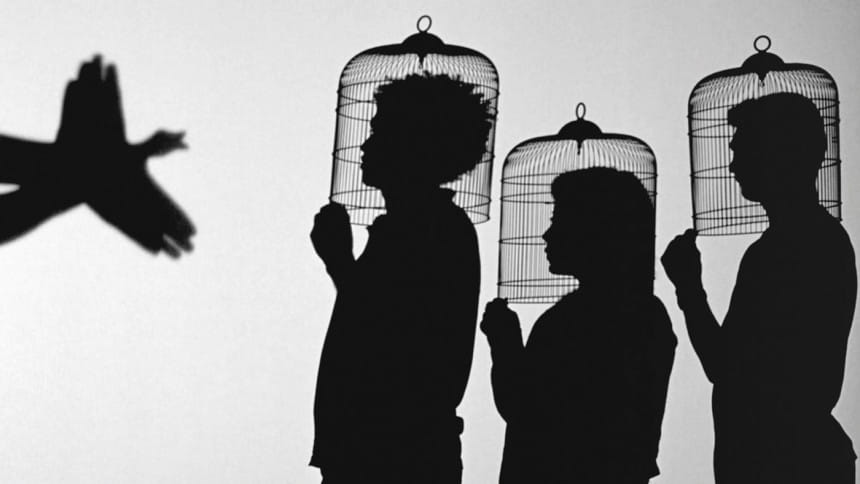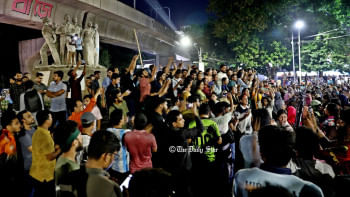Independent Bangladesh was built on values of inclusion and tolerance

I always believed I lived in a tolerant society. What else could one think, growing up in independent Bangladesh? The generations born after the Liberation War were brought up on stories of the birth of the nation and the fundamental policies enshrined in our constitution by the Father of the Nation—democracy, nationalism, secularism and socialism. We learnt of how a united nation fought the Liberation War, despite having collaborators in our own ranks who attempted to use a twisted and defiled version of faith to justify genocide and create a divided society. We overcame extremism, authoritarianism and prejudice, and chose freedom, democracy and tolerance instead, building a country based on principles of inclusion, with a place for everyone at the table—Banglar Hindu, Banglar Christian, Banglar Bouddho, Banglar Musolman.
All one had to do was look around them to see the signs of this liberal society. Is this not the country where folk culture thrives on every inch of the land, where there is a singer or a poet in every household, where the annual book fair draws more crowds than Eid sales and Humayun Ahmed's stories still sell like hot cakes? How can a society such as this, be anything but tolerant?
It was in 2001 when this illusion first shattered (for me), when two separate bomb blasts carried out by militant outfit Harkat-ul-Jihad struck at the heart of the capital's Pohela Boishakh celebrations at Ramna Batamul, killing 10 people and injuring 50 others. The carefully orchestrated attack on one of the most inclusive celebrations in Bangladesh, shown live on television and watched across the nation, sent a clear message in this new era of rising militancy—tolerance will not be tolerated.
This period saw terrorist bombings of places of worship—10 people were killed in the 2001 Gopalganj Roman Catholic Church bombing and 12 died in the 2004 bombing of the shrine of Shahjalal; assaults on centres of culture and entertainment—27 people died in coordinated bombings of cinema halls in Mymensingh; as well as attacks on journalists, teachers and political leaders, culminating in the horrific August 21 grenade attack on an Awami League rally. It was a time of great uncertainty and fear, at the height of which Jama'atul Mujahideen Bangladesh (JMB) exploded a total of 500 bombs in 300 locations across the country on August 7, 2005.
After 2016, international terrorism also reared its ugly head in Bangladesh, with ISIS and Al-Qaeda inspired attacks on religious minorities, secular bloggers, members of security forces and Sufi spiritual leaders. The painful memory of the 2016 Holey Artisan attack, one of the worst terrorist incidents this country has ever seen, is still etched in our national psyche.
The current government must be commended for its strong stance against such acts of terrorism and its active role in rooting out its exponents. However, terrorism is only the most extreme version of the intolerance that has, time and again, made its presence clear in our country. Unfortunately, we have not seen a similar level of political will in dealing with this issue—it was only this month, on November 7, that the Bangladesh Hindu, Bouddha, Christian Oikya Parishad implored the Prime Minister, once again, to intervene and stop attacks on minorities.
There is no denying that these past few months have been especially grim for tolerance in Bangladesh. On November 1, videos of a mob attack on several Hindu households in Muradnagar, Cumilla went viral, and the local administration had to impose Section 144 in that union to bring the situation under control. This came right on the heels of the horrific images of the charred body of Shahidunnabi Jewel circulating on social media. On October 29, he was beaten to death and burnt by an angry mob in Lalmonirhat who (falsely) accused him of desecrating the Holy Quran. During this year's Durga Puja, there were the usual reports of the goddess' idols being vandalised. According to the Bangladesh Peace Observatory, 18 temples have been attacked and 27 idols were destroyed up to September this year.
However, the growing intolerance in our society is not just reflected in assaults on different religious beliefs and ethnicities; there have been attacks on cultural spaces and the inclusive philosophies they represent as well. Many will remember the heart wrenching photo of Baul Ronesh Thakur standing in the remains of his music room, which was torched by miscreants in May this year. This is not the first time Bauls have come under attack—in 2011, religious fanatics shaved the heads and beards of 24 Bauls in Rajbari, and in 2016, 20 criminals assaulted and shaved the heads of three Bauls, including a woman, in Chuadanga. As The Daily Star columnist CR Abrar wrote in September, "such assaults are ultimately attacks on free thought and democracy."
And such assaults are, unfortunately, all too common nowadays. One only has to go on social media to see the intolerance that has crept into our daily interactions. A large number of attacks on minorities in recent years were incited by fake news being spread on Facebook, usually of a "report" or rumour of a minority individual posting something offensive about religion, with the most serious of such incidents being the 2012 Ramu violence that led to mobs destroying 12 Buddhist temples/monasteries and 50 houses in Cox's Bazar. Even beyond that, whether the online conversations are centred on marital rape, the eviction of indigenous communities from their ancestral land or the rights of hijras to receive religious education—the dogmatism (bordering on fanaticism) that surfaces is constant and reveals something sinister about us as a society.
It is only natural for human beings to hold their beliefs close to their hearts. But why are we so afraid of those who disagree with us? Why, instead of "agreeing to disagree", must we attack, verbally and physically, those we consider to be different? It is this refusal to allow differences to exist in society that is truly concerning, especially when this intolerance of differing voices have been institutionalised to a certain extent. If the authorities are complicit in silencing dissent, how do we expect the citizens to not follow suit? How else does one explain the incarceration of musician Shariat (Sarker) Bayati, who was arrested under the controversial Digital Security Act for "hurting religious sentiments" in December 2019, while those who spread fake news and engage in online hate speech that ultimately leads to the persecution of minority communities, walk free?
It is also important to remember that we are currently faced with a unique 21st century problem—we are a majority living with a minority complex. Islamophobia is a harsh reality in many parts of the world, including in our neighbouring countries, and many of the huge number of Bangladeshis living abroad have been victims of anti-Muslim sentiments. However, at the same time, we must acknowledge that some quarters are using this very real oppression of Muslims in certain countries to manipulate ordinary citizens into following radical and narrow-minded interpretations of religion. Everywhere in the world, we see different leaders playing to their respective galleries—as French President Macron flexes his liberal muscles to woo voters away from right-wing populist leaders like Marine la Pen, isolating and alienating Muslim immigrant communities in the process, so do leaders like Turkey's Erdogan and Pakistan's Imran Khan jump at the opportunity to cater to their voter base and denounce "liberal, anti-Muslim voices." Together, they contribute to creating increasingly divided communities across the world, where the victims of such polarisation are always ordinary citizens.
The religious conservatives in Bangladesh are no different; whenever a global conversation about Islamophobia arises, it is used as an opportunity to play on the sentiments of believers and promote certain intolerant agendas. This is where the authorities in Bangladesh have to navigate a slippery slope. We have already seen them give in to these intolerant voices, culminating in the removal of sculptures from public spaces and the removal of secular writers from our education curriculum. But once you give an inch, they are bound to take a mile, and we are now faced with demands that range from the distressing to the downright ridiculous—this week, there were reports of demands from a certain religious group to scrap the plans for erecting a statue of Bangabandhu in the capital, as well as the demand from a popular online religious "leader" that cricketer Shakib al Hasan issue a public apology for attending a Kali Puja celebration in Kolkata.
Freedom of religious beliefs and practices is enshrined in our constitution, but that has to apply to all religions, and it in no way gives us room to allow the use of religion as a shield for a radicalism which promotes beliefs that ultimately go against the values that this country was built on. The question we must now ask ourselves is—where do we draw the line? How tolerant can we be of intolerance?
Shuprova Tasneem is a member of the editorial team at The Daily Star. Her Twitter handle is @shuprovatasneem.

 For all latest news, follow The Daily Star's Google News channel.
For all latest news, follow The Daily Star's Google News channel. 



Comments